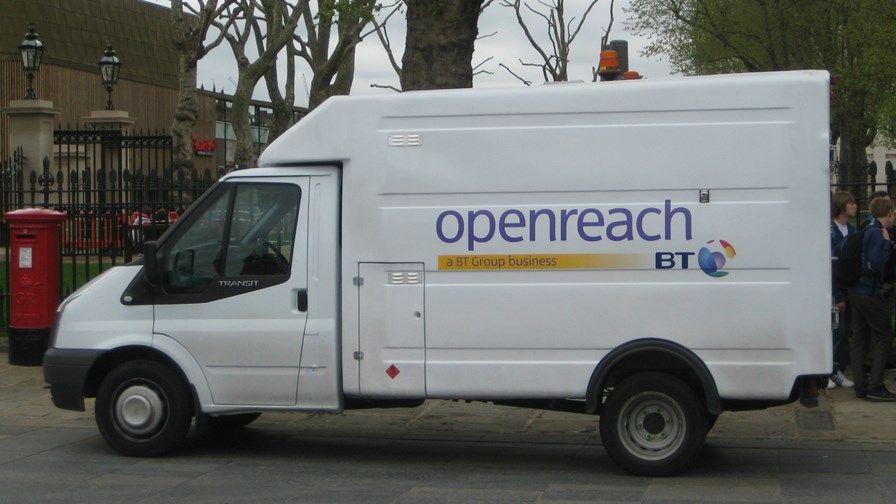BT takes a chill pill and relaxes its grip on Openreach, but will its TV play compensate?

via Flickr © AndyRobertsPhotos (CC BY 2.0)
- BT and Ofcom come to terms over Openreach
- Openreach legally separated, but remains a part of BT Group
- Move broadly welcomed, but many think it's just another step on the road to full separation
BT and Ofcom, the UK regulator, appear to have reached a sustainable settlement to the long-running dispute over whether BT’s access infrastructure subsidiary, Openreach - which provides the wires - should be completely separated from BT and run as an independent entity.
This question has been in the air ever since BT decided, as part of an earlier regulatory settlement, to establish Openreach as a means of showing willing on unbundling.
It was thought that by establishing a porous legal separation (rather than a full structural one) between wires and services, with separate businesses running each but under a BT umbrella, the telco could prove an ongoing lack of discrimination.
In effect, everything would be above board with all hands (and financial records) visible on the table. BT Openreach would charge BT’s competitors the same for line rental as it charged BT and it would treat all its service partners equally in terms of connection requests; fault tickets and so on. What could go wrong?
But the devil, of course, had sneaked down to hide in the detail - at least according to BT’s domestic competitors who are also Openreach’s infrastructure customers.
These had long complained that in a myriad of ways, Openreach favoured BT (which of course was still in complete control) and they experienced all sorts of unfairness - connection delays, appointments not kept, unfair treatment of customers wishing to switch and so on.
Then there was and is the question of further investment into the UK’s access infrastructure. How to ensure that Openreach is doing enough and in the right places?
So the call went up to fully separate Openreach. BT disagreed vehemently and threatened strife; Ofcom prevaricated and played for time - until today when Ofcom and BT have agreed to another advance towards a structural separation.
What's the new deal?
This time Openreach is to become a distinct, legally separate company with its own Board but remaining within the BT Group. BT says around 32,000 employees will transfer to the new Openreach Limited following consultations with the unions (pension rights and a huge liability are a problem for Openreach which is ‘baby-boomer’ heavy). Openreach will no longer sport the BT logo.
So how is the move being greeted by the rest of the UK telecoms industry and its adjacent sectors?
Predictably the consumer representatives welcome the move, expect greater competition and lower prices, but don’t rule out full separation in the longer term.
Similar sentiments have been expressed by UK analysts. According to Kester Mann, a Principal Analyst at CCS Insight, “BT’s rivals, notably Sky and TalkTalk, will publicly claim that the regulator should have gone further by enforcing a full structural separation. However, this option was always the most radical and controversial the regulator could have taken. In private they should be more than satisfied with the changes Ofcom has pushed through.”
Ovum’s Matthew Howett observes that ownership of assets remains with BT. “This had been a sticking point but it appears that Ofcom has been flexible and has listened to the concerns around the pension scheme,” he says. “Separately, BT has also said that it stands ready to support the government's universal service obligation for broadband, conditional upon reaching the right settlement with Ofcom. Now that has been achieved, plans can be developed.”
But the move must also be viewed in the context of the broader dynamics sweeping the industry. Why did the BT board and BT’s CEO Gavin Patterson, decide to move to an agreement with Ofcom right now when they fought so vociferously before to keep in close?
Perhaps having control of your access network and all its specifics no longer grants an incumbent network operator the total market power it once did.
“I think we’ve broken through to a new point,” says veteran UK telecoms analyst Chris Lewis of Lewis Insight. “Where before as an industry we had bandwidth scarcity, we don’t any more - if anything we have service paucity,” he claimed.
“Telecoms used to control things end to end, but now they just control the end. You’re seeing a realization that they are (just a) part of the solution, not the whole solution.”
Looked at in this way, it becomes clearer that there’s no way of price-controlling the data access market today when there are multiple networks - fixed and mobile - all vying for a share.
In that context fighting to the death with the regulator (BT’s CEO Gavin Patterson warned of ten years litigation when full separation was last up for discussion) over governance of the access network makes less and less sense as the access market continues to look more like a commodity.
What remains is content such as BT’s sports channel designed to get and keep customers with a decent profit margin. Is content-control, therefore, the 21st century replacement for bandwidth scarcity?
Chris Lewis points out that the wholesale access market (that Openreach is effectively in) may in reality turn out to be the more profitable, especially if BT and other telcos can use new technology to cut huge amounts of cost out of operating the network.
“I suspect that the content market is actually lower margin than the access market is today, it’s certainly more risky,” he claims. “TV is a harder business than I think many people think it is.”
Email Newsletters
Sign up to receive TelecomTV's top news and videos, plus exclusive subscriber-only content direct to your inbox.




